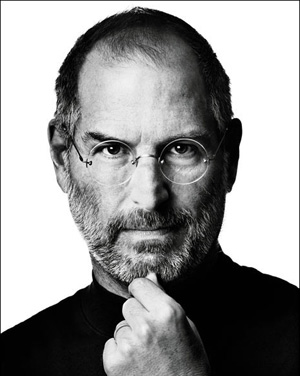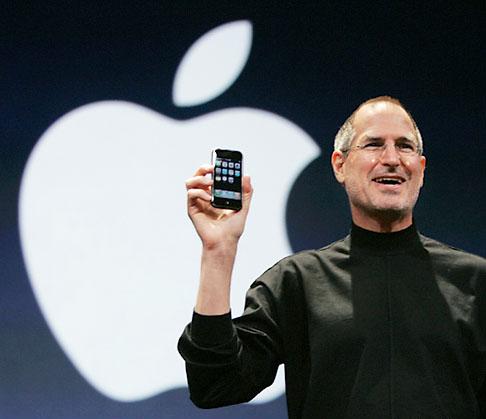Mobile Marketing Statistics
As a professional who has been in the online marketing world since it’s birth, “mobile marketing” was the “next big thing” touted in every marketing conference for the past 6 years. I was always skeptical because, mobile was ALWAYS mentioned as the next big frontier, but I saw no medium in which the marketing ads could be delivered. There was no evidence or the numbers to back that claim.
Then came the iPhone, which changed everything. (RIP Steve Jobs).

Apple iPhone (Steve Jobs) Ushers in the New Age of Mobile Marketing
Those who are just now reading articles about how Steve Jobs was a great visionary may not realize how much he really revolutionized every industry he touched. He isn’t just the CEO who introduced the iPod or the bringer of the iPhone. He literally led the way in creating products and ecosystems that created brand new industries and as a result thousands and thousands of jobs. Numerous companies out there can give some credit to their existence and growth to much of what Steve Jobs contributed to the technology sector. Think about the 100s of companies centered around building apps, or building games for the phone, apple product accessories, geo-location marketing companies, or mobile marketing service agencies. Think of all those companies centered around some product or service related to the digital music / mp3 market which not that long ago was owned by big media, then by organizations like Napster. Think about whole divisions created to tap into and create applications on tablets or all the cool little startups utilizing the social mobility of smartphones. Think about all the executives out there, innovators in their own right, sharing how Steve Jobs helped them conceptualize and grow their own companies. Apple products drove the strategy and goals of other competitors from big music labels, computer makers to phone carriers. The list goes on and on. There is a reason why Steve Job’s death has had led to such huge ripples across the nation. RIP Steve Jobs. Thanks so much for everything.
Just one of such industries that changed forever, is the mobile market.
How did the Apple iPhone change the mobile landscape?
Smartphone Becomes the Norm:
To put it simply, the iPhone made having a smartphone the norm. Only a few years back, very few had smartphones. Smartphones were reserved for the executives of big companies, mainly in the form of the blackberry. No one thought about using it as a “personal” device. It was too expensive, too hefty, seemed a bit complex. It was seen as a “professional” device. Everyone had flip phones and were content.
Then the iPhone became the “apple” of everyone’s attention. (oh no you didn’t!)
Simple. Affordable. Snazzy. Hip. Apple said, hey you want it. You need it. You can get cool apps on it. You can play games on it. You need a calendar. You need to access email instantly. You need it to watch videos. You need it to text with a bigger screen. All of syncs with your computer really easily so it’s easy to use. It was cool, it was hip, the iPhone.
 Steve Jobs drove Apple to create a product that is simple and affordable for the public. Just like the iPod, iPhones took the basics of what mass consumers use (surfing the net, watching videos, taking pictures, texting), and created a product that did those things well and made it easy to use. While most of the technology world was still competing over adding more and more complex features, Apple focused on the core-uses of the consumer and made it simple and easy. Suddenly smartphones became a personal device that everyone must have. As everyone started to buy iPhones, other mobile phone competitors jumped on the bandwagon, recognizing the shift in the market. Now everyone and their mother, and their teenager daughter has an iPhone. I’ve seen kids still in middle school with the iTouch giving them free access to the internet. Which I have problems with, but that is another story.
Steve Jobs drove Apple to create a product that is simple and affordable for the public. Just like the iPod, iPhones took the basics of what mass consumers use (surfing the net, watching videos, taking pictures, texting), and created a product that did those things well and made it easy to use. While most of the technology world was still competing over adding more and more complex features, Apple focused on the core-uses of the consumer and made it simple and easy. Suddenly smartphones became a personal device that everyone must have. As everyone started to buy iPhones, other mobile phone competitors jumped on the bandwagon, recognizing the shift in the market. Now everyone and their mother, and their teenager daughter has an iPhone. I’ve seen kids still in middle school with the iTouch giving them free access to the internet. Which I have problems with, but that is another story.
Easier to Browse the Internet
The iPhone has also made it much easier to browse the web. Once checking the internet on your phone was so painful, that often it was just not worth it. You would have to click 24 times just to get to the article you wanted. It would be hard to read, the links were the infamous blue, taking up half the screen. Clicking on it was impossible unless you had petite fingers. Not to mention the tiny screens where web formats would break or a unfriendly page of blue links dominated the user experience. It wasn’t worth it. Don’t even get started on the ads.
The iPhone suddenly made surfing the internet, easy and simple. It was just like browsing on the computer, just on a smaller screen. Full browser, full experience (minus the flash! save the complaints!). No more nasty mobile ad formats and spammy links or 14 clicks to get back to the homepage. Surfing the net on the mobile phone became a reality.
Created an App Ecosystem
The iPhone also did a fantastic job courting developers and creating a whole “app” centered world. All kinds of creative apps were developed, as well as numerous ways to connect with the consumer. There are so many interesting and creative geo-centered applications, interest based apps, productivity apps, and all of these apps became an avenue in which marketers can use to engage the users.
Mobile Marketing becomes Legit
What Steve Jobs and Apple did was legitimize ads on mobile phones. With the iPhone, it put smartphones in the hands on the consumer, it provided a good browsing experience like nothing before, and created an world of applications which opened up even more avenues to reach the consumer.
For the last year and a half, mobile marketing has become a huge play in the online marketing world. In fact in most industries, Mobile Marketing paid traffic you can find on Google alone will be greater than all of the traffic from Yahoo / Bing Paid Search combined. The quality has dramatically improved because users can actually read, click and engage the companies that serve the ads.
So for all you working in some field related to mobile marketing, give a little thanks to the innovations of Apple.
Mobile Marketing Statistics
Enjoy the mobile marketing statistics info graphic below.
Some of the highlights:
- 4 Billion Mobile Phones in Use
- 1.08 Billion Smartphones in Use
- 3.05 Billion are SMS enabled phones.
- By 2014, mobile internet should take over desktop internet usage.
- 50% of all local searches are performed on mobile devices.
- 86% of mobile internet users are using their devices while watching TV
- 200 Million Youtube Views occur on mobile devices
Average American spends 2.7 hours per day on their mobile device – socializing.
- 61% of users use their mobile phones for Games
- 55% to check the Weather
- 50% for Maps and Direction search
- 49% for Social Networking
- 42% for Music
- 36% for News
- 33% for Entertainment
- 25% for Dining
- 21% for Video
Take our poll below and tell us how YOU use your mobile device!
[poll id=”28″]
Mobile Marketing Infographic Statistics

5 Comments
Come on!
You are all salute a man who did computer stuff. Just as he deserve more credit than a single mother with an abusive ex-husband who takes care of their children.
Something is seriously wrong with the world when we focus on the business men as if they are heroes. No, I’m not a communist.
Yes! Job’s was primarily a businessman who created really cool stuff, which for him was very good business.
My point is that we devote great progress in his name. When all of us know that timing, being in the right position at the right time is everything. No one can believe that the things he has created and sold to us would not be created by someone else eventually. Maybe not tomorrow but in the end we would have all this stuff from someone else.
So come on. The only fair thing to do is to wish his family the best and move on to something important, such as the environment, hunger and trafficking and all other things which are not solved yet.
Yes I have a Mac, iPad, iPhone and iPhone and I like them very much. Thank you Mr. Job’s and rest in peace.
Hey PJ,
thanks for sharing your thoughts.
I actually don’t view him as a hero at all. i just think he was a great businessman, an innovator, who was able to do a lot for the technology sector. He had a huge hand (of course with all those working with him) in ushering forward a lot of new industries and businesses, that is just what happened. I would argue that not anyone can simply do what others do, there are a lot of companies trying to do what apple does right now but are failing at it miserably. Just giving where credit is due.
i do agree timing has a lot to do with it. men like steve jobs and bill gates had a particular personality, particular vision and of course came at a particular time that allowed the innovation they brought. timing of course has a lot to do with it. but timing is just one part of the equation.
Very few people can claim to leave a legacy behind them, Paul, and Steve Jobs was certainly one of those people…
Great infographic!
Adding your blog to my CommentLuv enabled blog list.
RIP Steve Job, it’s one of the biggest loss for lost a visionary and inspiring person like him. i adore the way he think and act. it’s like we have a dream that someday we can texting or calling someone just by a touch on a glass panel, and voila ! he turn our dreams come true. but now he’s gone, and i really hope there is someone as talented and as inspiring like him,
steve jobs was a revolutionary in the field of technology, I was very impressed with him. I’ve read his biography. Content is very impressive